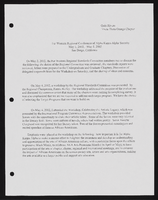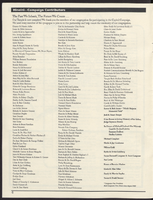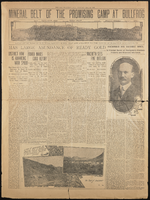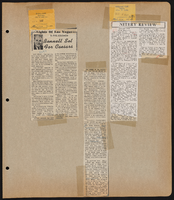Search the Special Collections and Archives Portal
Search Results

Transcript of interview with Gilbert D. Yarchever by Claytee White, 2006
Date
Archival Collection
Description
Gilbert Yarchever was one of nine siblings, born and bred in Pittsburgh, Pennsylvania. He describes the way his mother?s family was granted the last name of ?Kurfeersf" by Emperor Franz Joseph (of Austria-Hungary), explains the Seder (the Jewish observation of the exodus of Hebrews from Egypt), and tells what it was like to survive the Depression. Gilbert describes the jobs he held after high school and the government examination he took that led to his lifetime of adventure and travel. He moved to Washington, D.C., in 1940 and kept himself busy working for the government and taking classes at George Washington University, as well as working part time at Hecht Department Store and as a freelance court reporter. Following the attack on Pearl Harbor in 1941, Gilbert was sent to Africa on a merchant ship, helped smuggle Jewish survivors into Jerusalem, and was assigned the task of negotiating with Arab sheikhs for laborers to build a road. In the years after that, he worked in Europe, Panama, Alaska, Japan, and Hawaii and describes many of the jobs he was responsible for and many of the individuals he met. He also married and had children, kept up with university classes whenever he could, and collected art objects and paintings. Following his retirement in 1977, Gilbert and his family came to Las Vegas and bought a condo in Regency Towers. He did some consulting work for a couple of years, and then he and his wife began traveling around the states and going abroad. He was involved with UNLV?s EXCEL program, the music department, and the Las Vegas Art Museum. (He and his second wife Edythe presented the first major exhibition on Holocaust art at the museum.) These days Gilbert often donates pieces from his art collection to churches, synagogues, and charitable organizations.
Gilbert Yarchever was in the Navy during World War II, helped smuggle Jewish refugees into Jerusalem, worked as a civil servant in many countries, and moved to Las Vegas in 1977. He helped found the EXCEL program at University of Nevada, Las Vegas and was an art collector with his wife, Edythe Katz-Yarchever.
Text
Junior League of Las Vegas' Records on the Morelli House Preservation Project
Identifier
Abstract
The Junior League of Las Vegas' Records on the Morelli House Preservation Project contains the records of the Junior League of Las Vegas and the organization's efforts to preserve the Morelli House in downtown Las Vegas, Nevada from 1997 to 2017. Records are comprised of various internal and external planning documents, research files, advertising and publicity, correspondence, grant files, and photographs. Also included in this collection are scans of original planning documents and drawings used by Las Vegas, Nevada architect, Hugh E. Taylor, during construction of the Morelli House in the 1950s.
Archival Collection

Transcript of interview with Robert "Bob"Agonia by Marcela Rodriguez-Campo, September 6, 2018
Date
Archival Collection
Description
Robert “Bob” Agonia (1938- ) was born in Garden Grove, California on a migrant camp made up of Filipino and Mexican-American workers. Agonia’s father was a farmer on a 70 acre farm owned by the Beggs family. Agonia did not spend much time living on the migrant camp, as his father moved the family to a private residence when Agonia was four. Agonia attended school, during an era of school desegregation in Garden Grove. He recalls that his mother dealt with segregation during her schooling, being forced to attend a school miles down the road from her home despite living across the street from another school. Agonia recalls his community being very diverse with families sharing Filipino and Mexican-American heritage and his neighbors being Japanese Americans. Agonia participated in a multicultural Boy Scout troop. After high school, Agonia joined the Peace Corps and served in El Salvador. While there, Agonia worked in an agricultural research center in Santa Tecla where he helped local farmers select the proper insecticide for their crops. After the Peace Corps, Agonia had his choice of government jobs, ultimately selecting to work for the Internal Revenue Service. Agonia’s work with the IRS is what eventually brought him from California to Las Vegas. He quickly realized that the type of IRS cases he would be handling in Las Vegas were completely different from the work he was accustomed to in California. One of those unique cases required him to close the doors of a downtown casino. Since moving to Las Vegas, Agonia was critical in establishing a Las Vegas LULAC chapter, an American GI Forum, an EEO council, and the UNLV Engineering school.
Text

Mirtha Rojas oral history interview: transcript
Date
Archival Collection
Description
Oral history interview with Mirtha Rojas conducted by Marcela Rodriguez-Campo on December 6, 2018 the Latinx Voices of Southern Nevada Oral History Project. Mirtha talks about her artistic upbringing in Cuba and how she immigrated to the Florida with her brother. She talks about relocating to Las Vegas in 2000, her membership with the Culinary Workers Union Local 226, and her employment as a guest room attendant and shop steward at the Aria Hotel and Casino.
Text

Alpha Kappa Alpha Sorority, Theta Theta Omega Chapter 73rd Far Western Regional conference agenda and report
Date
Archival Collection
Description
From the Alpha Kappa Alpha Sorority, Incorporated, Theta Theta Omega Chapter Records (MS-01014) -- Chapter records file.
Text

Alber A. Mora oral history interview: transcript
Date
Archival Collection
Description
Oral history interview with Alber A. Mora conducted by Rodrigo Vazquez and Laurents Bañuelos-Benitez on December 7, 2018 for the Latinx Voices of Southern Nevada Oral History Project. Alber Mora talks about his life growing up in Cuba with his family and the circumstances of their departure from the country; his brother faced pressures to join the military, which led the Mora family to immigrate to the United States by way of a fishing boat in 1994. Alber discusses the family's lives in Houston, Texas and how he met and married his wife, Rosemary, before the couple moved to Los Angeles and Alber began working at Porto's Bakery, a famous Cuban eatery in L.A. Alber shares how he and his wife eventually moved to Las Vegas, where he works for Caesar's Palace and for the Culinary Workers Union as a Shop Steward.
Text



